Ghost Gun
By: Debbie Strange
Canada
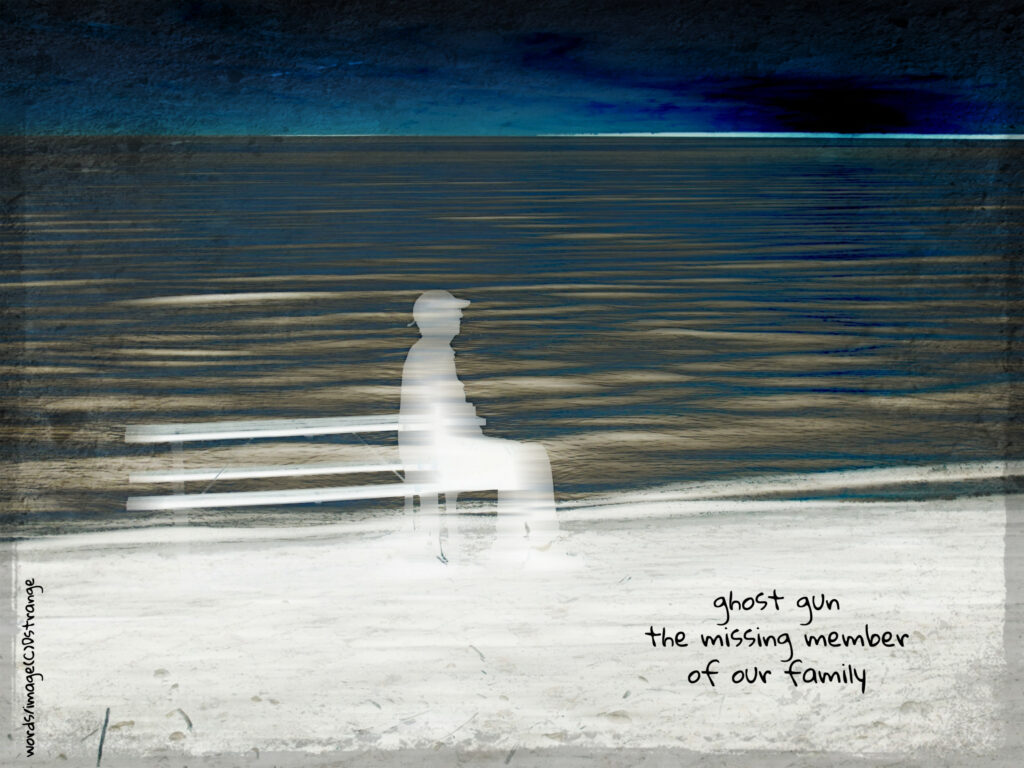
First Published: Human/Kind Journal, November 2020
Raising awareness of global concerns through a marriage of the arts.
By: Debbie Strange
Canada

First Published: Human/Kind Journal, November 2020
By: Debbie Strange
Canada
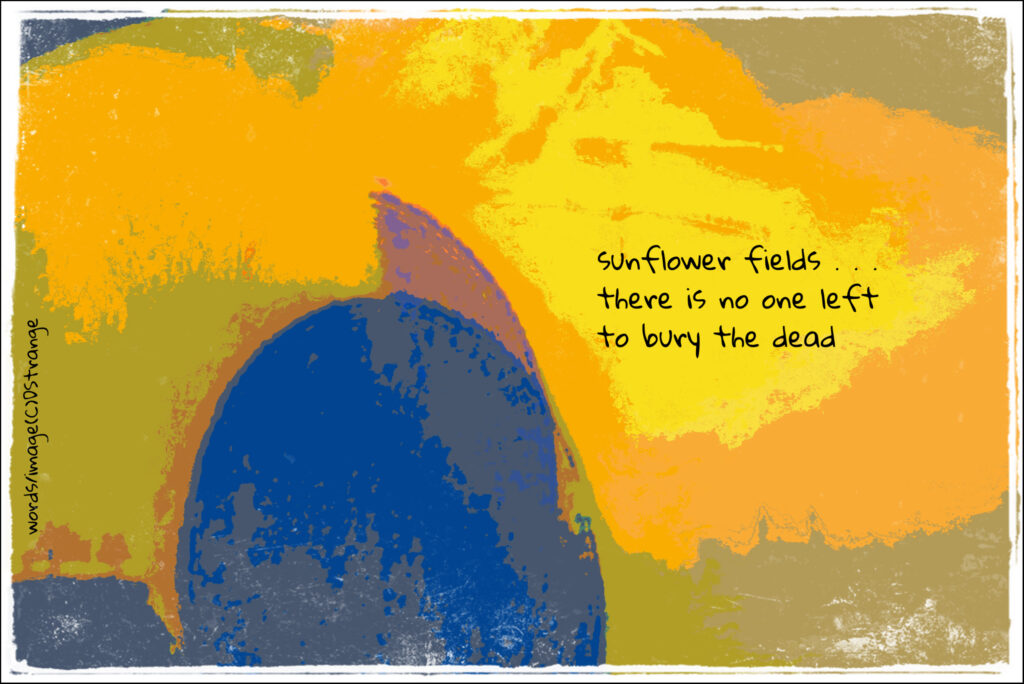
First Published: Frameless Sky, Issue 16, June 2022
By: Fatma Zohra Habis
Algiers, Algeria
childhood
between war and sun
dreams
By: Fatma Zohra Habis
Algiers, Algeria
ongoing war
a stranger digs the grave
for a stranger
By Diana Webb
Leatherhead, Surrey, UK
It towers above the park this tree . An ancient haven with countless generations of birds to its name. It teems with wildlife down through its roots.
Painters have painted it, poets penned poems on it, children danced and sang round the girth of its trunk.
Now there are plans for this space with a landmark. High rise tower blocks. Multi-story car park. Big hotel. Lots and lots and lots of concrete which will always resound with the multi-wave echo of the crash of a tree.
layered picnic rug
with shade of myriad summers
we shake out the tears
By Bryan D. Cook
Orleans, Ontario, Canada
It’s a taboo topic in polite society, but the ads don’t hold their punches when it comes to extolling the virtues of triple-ply, soft and scented toilet paper as tested by a family of teddy bears! My own testing shows that I have to fold many pieces to gain satisfaction; using many rolls and thus increasing the company’s profits.
That is until I discover its high tensile-strength brand, 100 percent recycled with a promise to plant one tree per carton. No plastic wrapping and a fair price.
I’m so happy with this product that I write the company, congratulating on its commitment to ecological sustainability. A thank-you email from the quality control division asks for my home address so that a token of appreciation may be sent. This wasn’t my motive but, nonetheless, it’s a nice gesture.
Friends speculate that a tractor trailer may off-load a year’s supply on my driveway for all the neighborhood to share, or I may be subscribed to a lifetime of toilet paper.
Finally, a letter arrives enclosing a $5 coupon off my next purchase. Heavens, labour and postage cost more than that! And this largess is coming from a corporate giant whose website boasts at being “unapologetically human.” I’m left wondering if miserliness is one of its human traits.
Marley’s ghost
converts Ebenezer Scrooge
an unlikely tale
Marley’s ghost
rattling the chains
of corporate greed
climate change
converts Ebenezer Scrooge
threadbare apartment
his inheritance
under the mattress
an unlikely tale
big pharma
caring for addicts
“Bah, humbug!”
Marley’s Ghost and Ebenezer Scrooge are characters from Charles Dickens’
A Christmas Carol, first published in 1843.
By: Joe McKeon
Available now at Red Moon Press -> To Whom It May Concern
In To Whom It May Concern, Joe McKeon brings the haiku form to bear on social issues in a format that both informs and engages. This work exemplifies the role poetry, particularly short forms such as haiku, tanka, and senryu, and more specifically, the voice of the poet, has to play in the future of this planet and the wellbeing of its inhabitants. I’ve had my copy for many months now and it is yet to make it onto the bookshelf. It keeps moving with me from room to room as I digest its contents on deeper and deeper levels. Every page, another eye-opener.
Richard Grahn
Founder, The Abstractaphy Initiative
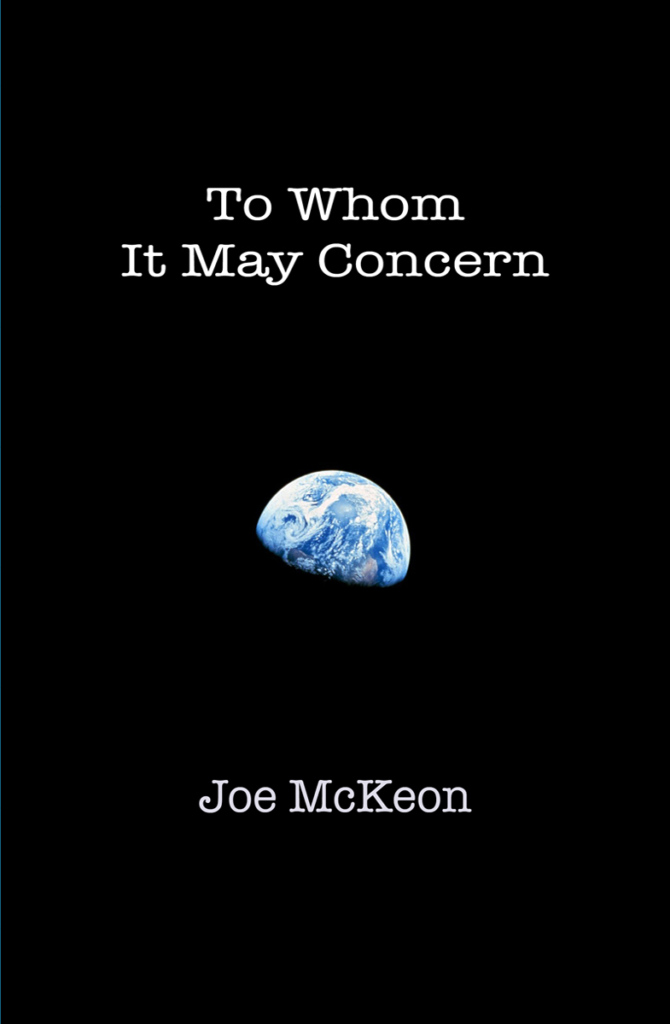
By Debbie Strange
Canada
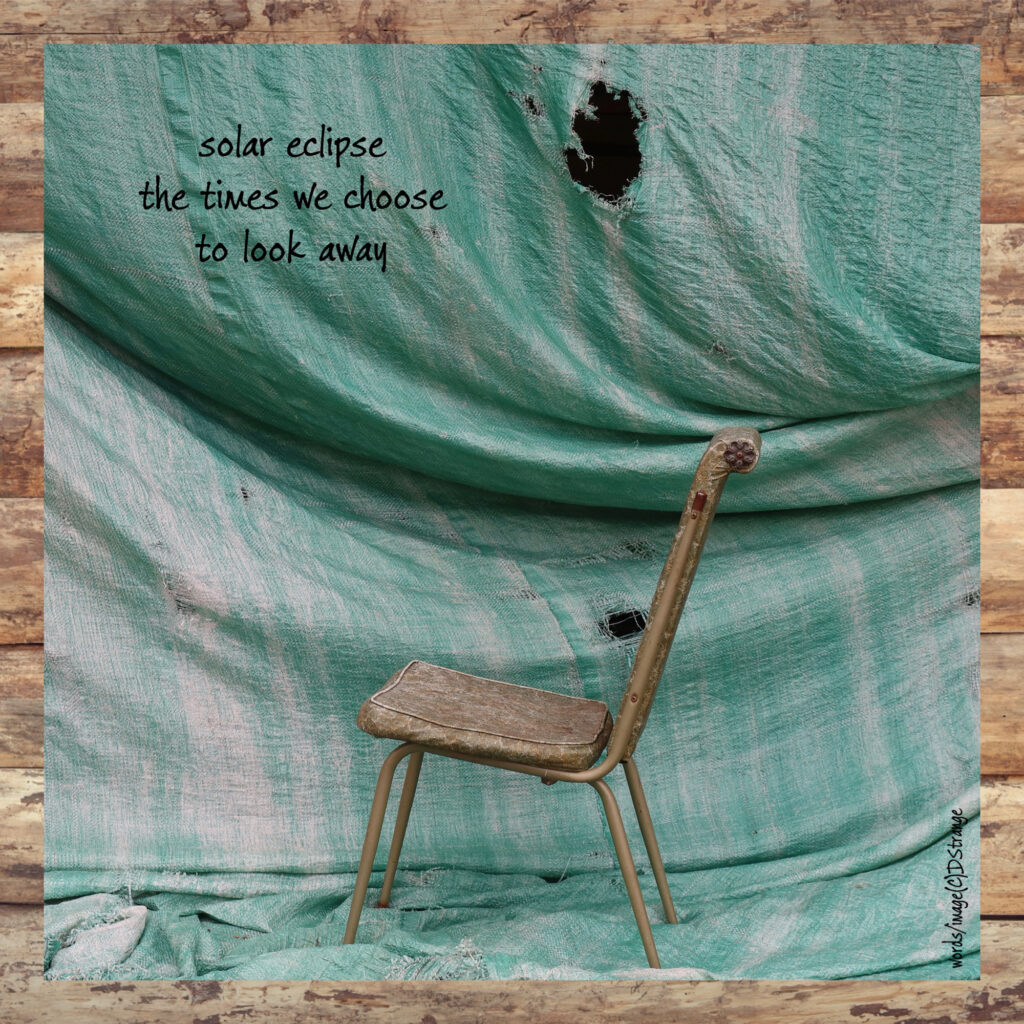
Honourable Mention, 2024 H. Gene Murtha Memorial Senryū Contest
By Jenny Ward Angyal and Autumn Noelle Hall
Walking Widdershins is comprised of 108 sets of collaborative tanka, a genre of Japanese short-form poetry more ancient than haiku. Historically, tanka were often exchanged between two poets as a kind of poetic conversation. The tanka conversations in this volume were written over the course of a single year and reflect the poets’ rootedness in the places where they live, their love for the natural world, and their concern for the havoc the human species is wreaking upon it. In his ‘Afterword,’ David C. Rice, tanka poet & editor, asks “If the root problem of our planetary crisis is that we see ourselves as separate from the natural world, not just another part of it, couldn’t two poets writing together offer poems that would help connect us with the natural world in ways an individual poet could not accomplish?” Four original, full-color mandala illustrations allow readers to visually enter and interact with the poetry.
Available now on Amazon: Walking Widdershins: An Ode to Joy
Read the review by Don Miller here:
By Debbie Strange
Canada
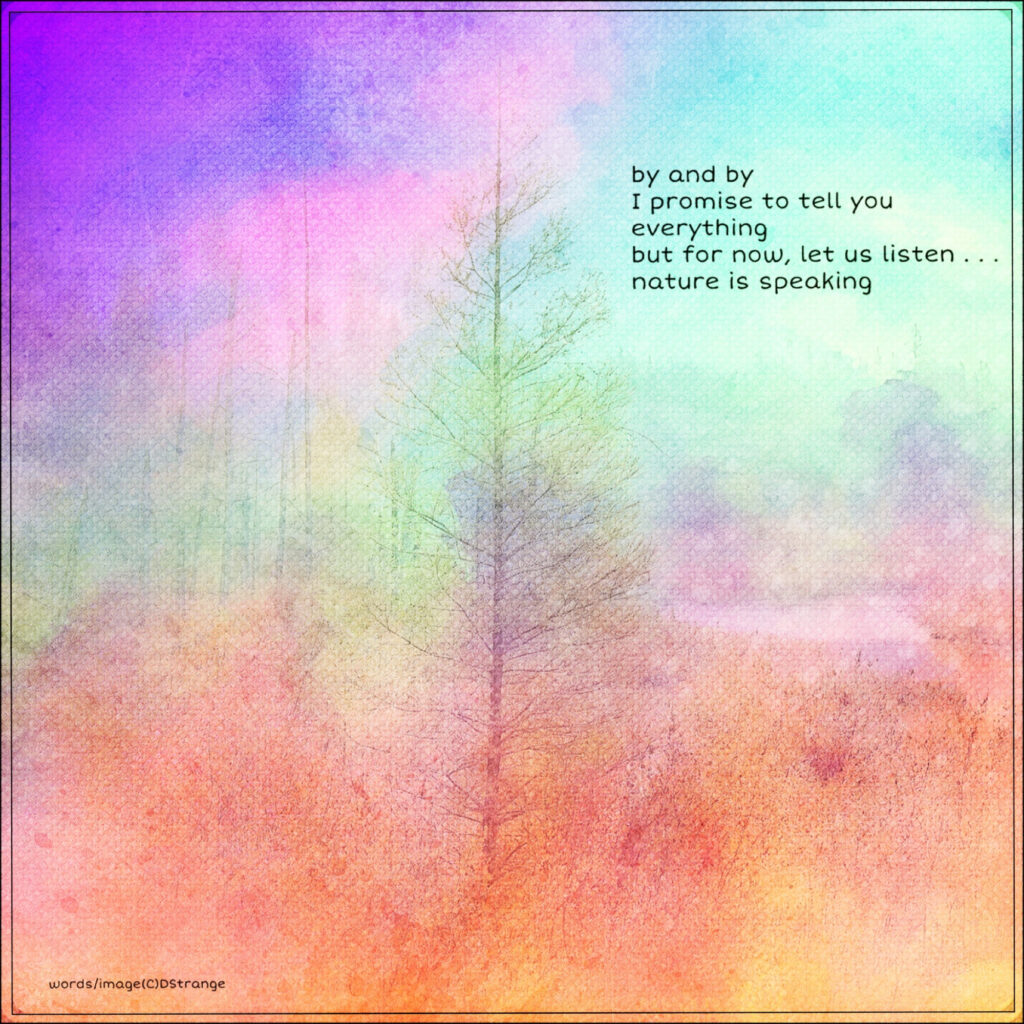
Editor’s Choice, Cattails, October 2020
By Debbie Strange
Canada
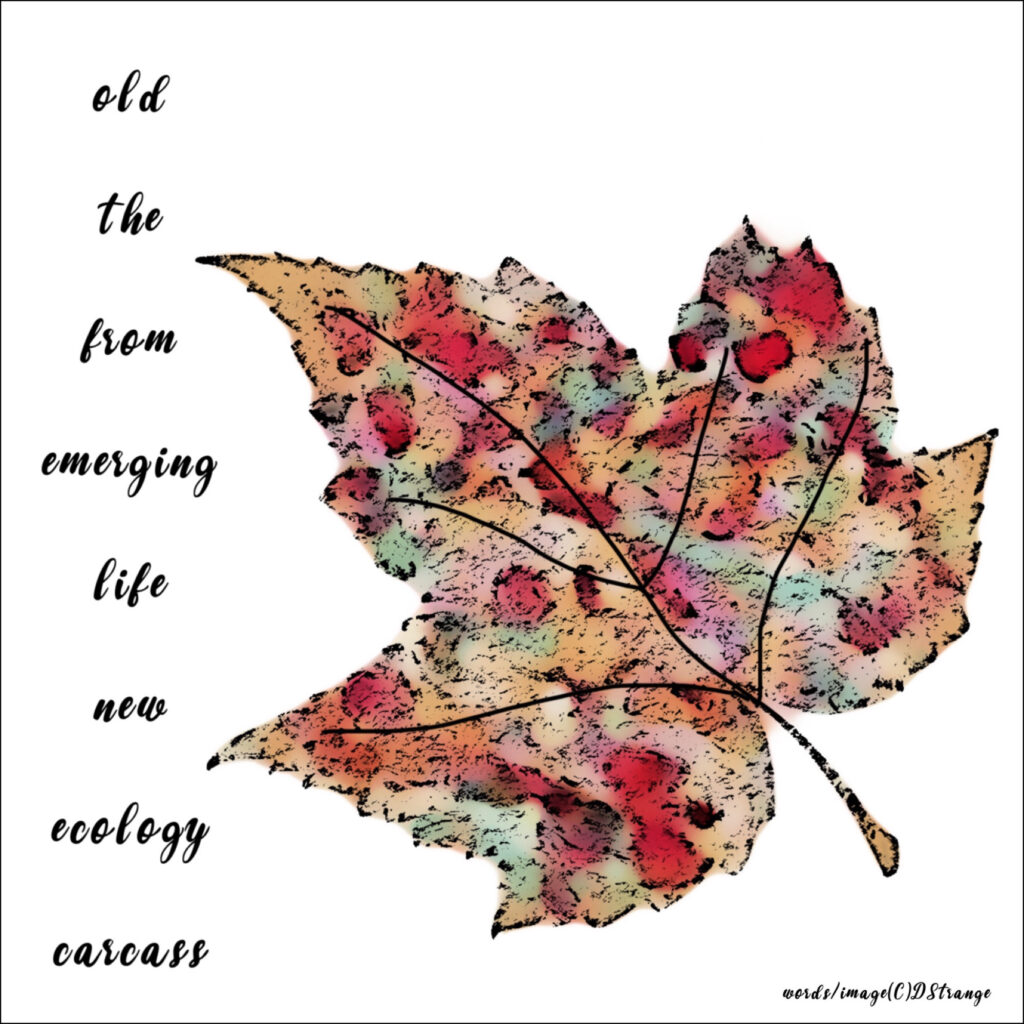
Half Day Moon Journal, Issue No. 1, August 2023
By: Anna Cates, Wilmington, Ohio
and Steve Van Allen, Cincinnati, Ohio
A kilometer from Ankor Wat, at Ta Prohm, a Mahayana 12th century Buddhist temple. Huge fig trees hang over the temple and spread across the ground. Moss grows green over the temple stones.
I walk around the walls and note three young saffron-robed monks sitting around a campfire. They call out, “Sok subai,” and wave. I wave back and walk on.
When I get back to my driver, I ask what the phrase means. He says, “Are you happy?”
In decades since, I have often wondered, am I happy?
The US fell to 23rd in the World Happiness Index last year.
moon’s halo
melancholy blue
memories
By: ©Noris Roberts
Lecheria Municipio Urbaneja, Venezuela
You will hear that the day is of pearls
and the night a percussion of stars,
that the enemy’s evil plays at misfortune
and sinks its claws into you when you least expect it
You will hear that the weapon of violence
is man’s by nature,
that the blue is just a line in the dawn
You will hear that there are voices that shriek with envy
and pain is forever
You will hear that suffering never finds
the safe conduct of justice
You will hear that freedom is an inverted illusion
that sometimes leads you to doom
Of kindly greens are the mountains covered,
and of dazzling colors of the twilight on the horizon
When the drought cloaks you
with its furious garb, there will always be glimmers
of hope in the reflections of some twilight and in your thoughts
As Goethe wrote, “How blessed is he in whom the fond desire to rise from the sea of error still renews hope! What a man does not know, he needs, and what he knows, he cannot use. But let not fickle thoughts cast their shadow O’er the calm beauty of this serene hour! In the rich sunset, see how brightly it shines.”
Carter Center Statement on Venezuela Election
Oirás que el día es de perlas
y la noche percusión de estrellas,
que la maldad del enemigo juega al infortunio
y te hunde las garras cuando menos lo esperas
Oirás que el arma de la violencia
es del hombre por naturaleza,
que el azul es apenas una línea en la aurora
Oirás que hay voces que chillan de envidia
y el dolor es para siempre
Oirás que el sufrimiento nunca encuentra
el salvoconducto de la justIcia
Oirás que la libertad es una invertida ilusión
que a veces te conduce a la fatalidad
De amables verdes están cubiertas las montañas y
de deslumbrantes colores el crepúsculo en el horizonte
Así cuando la sequía te cubra con su furioso ropaje,
siempre habrán destellos de esperanza
en los reflejos de algún crepúsculo
y en tus pensamientos
Como escribió Goethe: “¡Cuán dichoso aquel en quien el afectuoso deseo de salir del mar del error renueva aún la esperanza! Lo que el hombre no sabe, lo necesita, y lo que sabe, no puede usarlo. Pero que los pensamientos volubles no ensombrezcan la calma belleza de esta hora serena. En el rico atardecer, mira cuán brillante brilla”.
By Elizabeth Crocket
Ontario, Canada
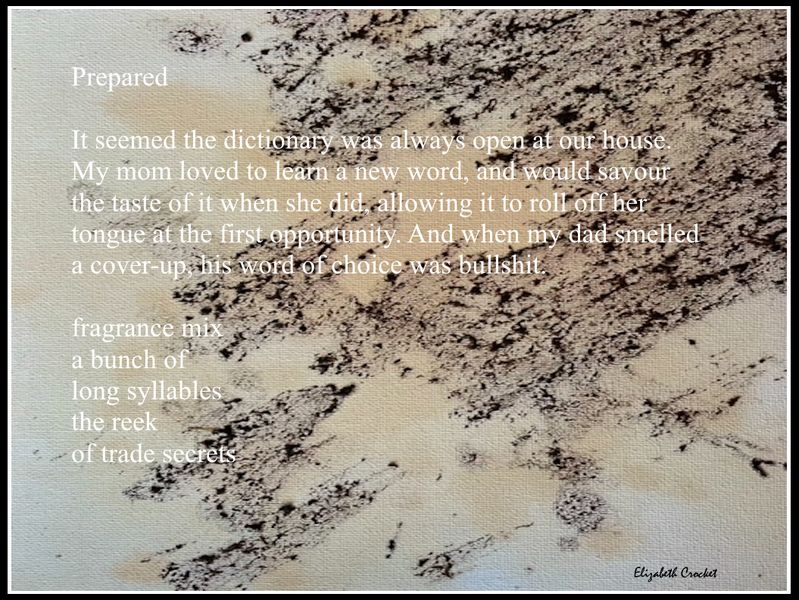
by R. Suresh babu
Chikmagalur, Karnataka, India
aquarium show
guppies for sale
in polythene bags
By Theresa A. Cancro
Wilmington, Delaware, USA
sooty smokestacks
where dinosaurs
once grazed
By Theresa A. Cancro
Wilmington, Delaware, USA
faint aurora . . .
a polar bear clambers
onto the shrinking floe
By Anna Cates
Wilmington, Ohio, USA
. . . and she wilts like wet paper,
her watercolor life bleeding pink
across unfinished pages,
the faintest pink, like the weakest sunset,
where purple fails and pales, thinning,
her voice, their voices, mortal voices,
angel voices, demon voices, choices,
choices, such agonizing choices . . .
fragrant
chrysanthemums . . .
prayer threads
*Medical Assistance in Dying, Canada’s euthanasia program, legal since 2016 and expanded in 2021 to include those suffering without foreseeable death.
By Florence Heyhoe
County Down, Northern Ireland
“Your father was a great man,” said Theadora, “He used to stay at our house, he fished up Gortin way with my husband, they would talk for hours; they were good friends.”
slippery eels
sizzling in the pan
caught netted
I know better. I have seen him cross the line at times teasing cats: tumbling into cruelty. He told me a story once of a Siamese that sprung at him from the top of a door, sinking in teeth and claws on landing. Serves him right. He beat the living daylights out of my brother, locked him in with the hens, used his fists and the strap to beat the good name into him.
cows in line
mooing a sad song
leather and meat
Folk spoke well of him, he was a pillar of respectability and helpfulness and an elder in the church. A diabetic, he kept his bible in the car amongst the sweetie papers and dispensed pills day and night. He put bad into me, secret sin in secret places, thrusting me to smithereens He photographed the children’s smiles in chapel and church.
peas in purple pods
round and green and sweet
hungry worms
First Published: Her other language 2020
By Florence Heyhoe
County Down, Northern Ireland
He took the children in his arms . . . and blessed them
I watch her marching into the middle of the road, wearing a white coat carrying her lollipop. The traffic parts like the Red Sea and the children cross over safely. Some walk hand in hand others skip. Most smile but a few are scowling on their way to school.
There are other places where they take children, herded like cattle, delivered. Crossed over to sordid places, devoid of smiles. Here, there, everywhere, congregations of lecherous deviants drool and throw silver coins.
First Published: Drifting Sands Haibun, Issue 20